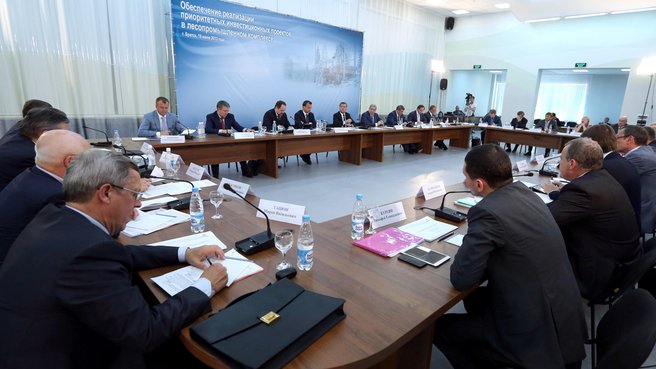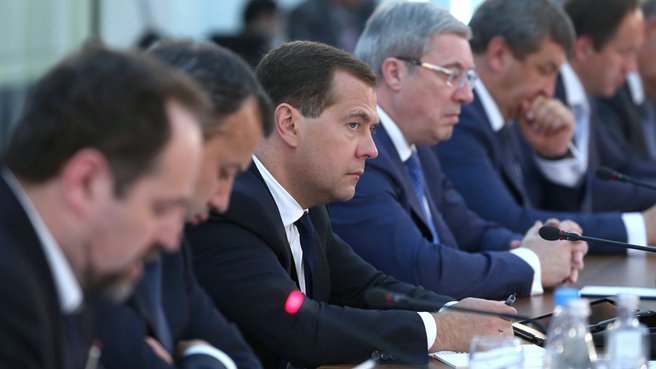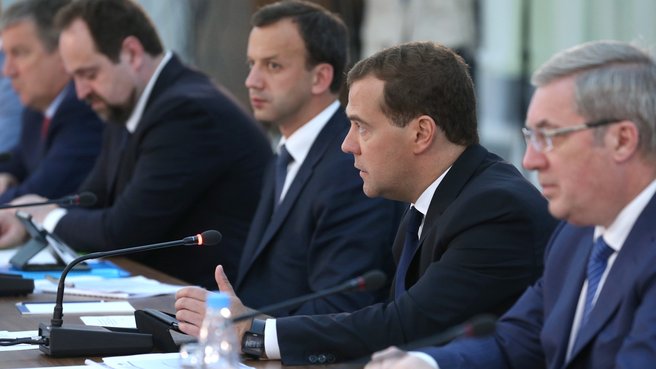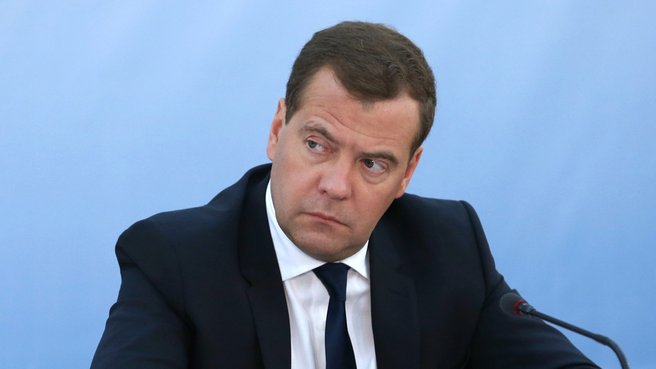Participants discussed the implementation of priority investment projects and proposals for further incentivising investment in the timber industry.
Transcript:
Dmitry Medvedev: Good afternoon, colleagues.
Meeting on the implementation of priority investment projects in the timber industry sector
We have gathered here to discuss the timber industry sector’s development. And I suggest that we get right down to the point in our discussion. This is an important and complicated issue for Russia. A State Council Presidium meeting has recently been held on this. I would like those present to assess the current work being carried in this area, how specific instructions are being fulfilled, what instructions are not being fulfilled, and what else has to be done …
Indeed, we should discuss what else can be accomplished in order to develop specific facilities and to implement major investment projects similar to the one we have just heard about. I would like once again to congratulate Ilim Group, which addressed this issue and opened a new production facility. This is, of course, a substantial amount of investment and high level technical equipment supply. I hope that the project will benefit the region and the city by creating jobs and obtaining additional sources of development.
Of course, this sector includes extremely diverse enterprises, large one and not so large ones, and there can be no standard prescription here. Nevertheless, certain decisions were made over the past few years in order to ensure the development of the sector. I cannot say that the situation has changed drastically, but, nevertheless, it did develop. Apart from investment project incentives, we subsidise rates on loans which have taken out in order to modernise enterprises, to create high-tech production facilities and to stockpile inter season timber, raw material and fuel. Incidentally, this has mostly proved effective. But there are few investment projects. Over the pre-crisis period, since 2007, only 27 out of 117 investment projects have been implemented, or less than 25% in six years. These statistics are not very impressive. Let’s discuss what can be done in order to make these investment projects more popular and to create economic mechanisms for their implementation. I have an idea of the issues you will speak of. This is why I have once again invited the ministers who are responsible for specific sectors and regional leaders. Naturally, representatives of the industry, in whose interests these decisions are being made, are also present.
I would like to mention several other aspects. First, certain asset attraction mechanisms definitely need fine tuning. Our task is not just to improve the investment climate. This is a general task that concerns not only the timber-industry sector but the entire economy. I am also talking about additional opportunities to attract long money and long-term loans into the timber-industry sector. This involves federal and regional decisions, as well as efforts to monitor the relevant investment.
Second, major projects like the one we are witnessing today show the active use of partnership mechanisms, including partnership among private investors and public-private partnership. I realise that the business community perceives state involvement in creating the energy, road and utility infrastructure to be highly important, to the extent to which this concerns you. We will also discuss these issues today. Moreover, I have just told the Governor that people expect these major projects to change the entire social environment, including in Bratsk, and in any other cities, and they directly associate business success with their expectations. This is not always directly linked, and we should think about how to ensure optimal cooperation between the Federal Government, regional authorities and the business community.
Dmitry Medvedev: Our task is not just to improve the investment climate. This is a general task that concerns not only the timber-industry sector but the entire economy. I am also talking about additional opportunities to attract long money and long-term loans into the timber-industry sector. This involves federal and regional decisions, as well as efforts to monitor the relevant investment.
Third, I would like to note that we are upgrading the Forest Code, and this is a permanent process. The work is underway. For instance, it was suggested that tenders for the right to sign lease contracts be legally formalised, that lease-holders be induced to fulfill their obligations and to invest in forest protection and renewal, and that specific criteria for selecting categories of forest that require protection be stipulated. I would like to know how this work is proceeding, and whether the business community and my colleagues, regional leaders, have any new ideas on this issue.
This, approximately, is the range of issues. My introductory remarks will not be long. The main legislation improvement mechanisms have been launched, and let’s hear how this work is being organised. First, I would like to give the floor to the Minister of Natural Resources and Environment. Our other colleagues, including governors, will speak later on. I have only one request: please be brief, down to the point and, naturally, specific. Mr Donskoi (Addressing Sergei Donskoi), you have the floor.
Sergei Donskoi: Mr Medvedev, colleagues. First, I will very briefly update you on the implementation of directives issued by the State Council during its meeting held on April 11. We have identified 26 areas of work, of which 18 are handled by the Ministry of Natural Resources. Draft laws have been developed for all areas handled by the ministry, including eight that are due to make it out of the Government as early as September. We have held meetings to discuss these issues, so these documents have been thoroughly discussed and are ready for adoption. Our key document – State Policy Priorities for Using, Protecting and Regenerating Forests – has been released and is being actively discussed. We hope that it will be published in October.
There are several important issues related to promoting investment projects. As is known, investors have two important incentives. One of them is favourable leasing terms, with a 50% discount. The government spends two billion roubles a year on this. Another investment incentive provided to companies that invest in forest operations involves the auction-free transfer of forest land for investment projects. The ministry is monitoring resource supplies for priority investment projects. Today, the required forest resources amount to over 70 million cubic metres. All forest areas have an annual allowable cutting rate of about 60 million cubic metres, meaning that the priority investment projects’ needs for timber are met by more than 80%.
However, I must admit that the amount of timber provided to investors is low in some Russian regions, such as the Republic of Karelia and the Republic of Bashkortostan, which have three investment projects on track with only 22% of their needs met. In the Sverdlovsk Region, investors’ timber needs are only 40% covered, and in Buryatia the figure is 51%. In the Primorye Territory, investors, in accordance with court rulings, leased forest resources that are almost double what they can process given their production capacity. They were given two million cubic metres when their actual need is only 1.2 million.
Notably, a number of companies have fallen behind the construction and renovation schedule provided in their approved projects. On top of that, they are reselling the timber instead of processing it in accordance with their investment projects. Often investors are exporting raw lumber. With this in mind, we propose (we have two proposals in this area) establishing additional grounds for refusing to sign auction-free lease agreements if a forest plot is not included in the concept of a priority investment project and also establishing grounds for terminating lease agreements with companies carrying out priority investment projects if they do not comply with the project schedule.
Sergei Donskoi: Investors have two important incentives. One of them is favourable leasing terms, with a 50% discount. The government spends two billion roubles a year on this. Another investment incentive provided to companies that invest in forest operations involves the auction-free transfer of forest land for investment projects. The ministry is monitoring resource supplies for priority investment projects.
With regard to developing forest infrastructure, it is well known that undeveloped forest infrastructure or the lack of infrastructure as well as the poor quality of forest roads inhibits the uniform development of leased areas. Given the costs involved in producing timber, raw materials for the implementation of investment projects become expensive. We propose introducing a uniform definition for the term “forest roads” in the forestry law, and we are working on it now. Rising prices for fuel and rail tariffs make transporting timber more expensive. To address this, we propose introducing discounts for transporting timber for distances over 600 km. We will look into this together with the Ministry of Transport, the Federal Customs Service, and the Federal Antimonopoly Service in order to make transporting timber by rail more efficient.
The next issue has to do with outdated forest management materials. According to the Federal Forestry Agency, forest management information for over 60% of forest land is obsolete. Often neither forest management authorities, nor the investors have up-to-date information about the make-up of forest plantations, timber reserves, or their quality. This increases business risks and makes production and economic planning impossible. Of course, we need to be aware of the prospects of forest resources in order to be able to implement priority investment projects and have fresh data about the quantity and quality of forest projects. To do so, we need to perform a forest inventory in commercially promising forest areas. The recently adopted state programme allocates nine billion roubles for these purposes, but the funding mechanism for this nine billion hasn’t been properly set up. We are working on this issue and would like to bring it up for discussion during the next session of the Budget Commission.
The last issue that I also wanted to discuss today is the bioenergy as a means to increase the profitability of investment projects. Developing bioenergy is one of the key tools for improving the profitability of the logging and timber business. Today, we are losing more than a third of harvested timber in the form of unrecoverable processing waste, such as wood chips, sawdust, bark, and small timber. We need to develop the municipal energy industry on the basis of processing low-grade small timber, wood waste and wood biofuel. This, of course, will create a synergistic effect in which we will acquire new capabilities in procurement, transport, processing, and power generation, create new jobs, and expand traditional markets for timber, which will help us solve our forest management problems and clear the forest of low-grade and dead wood. Thus, we believe that it is imperative to establish a special procedure for selecting bioenergy projects, include them in the list of priority projects, reduce the corresponding investment volumes to 100 million roubles, subsidise the cost of municipal boiler plants for transporting firewood from forests, and subsidise the interest rates on leasing and lending for the purchase of the requisite technical equipment. Also, it’s imperative to revise the accelerated depreciation rules for manufacturing equipment, which is included in the concept of such investment projects, and to consider the investment tax credit with regard to investment projects involving bioenergy.
That concludes my report, thank you.
Dmitry Medvedev: Over to Georgy Kalamanov from the Ministry of Industry. Please, go ahead.
Georgy Kalamanov (Deputy Minister of Industry and Trade): Colleagues, we were also given instructions following the meeting of the State Council in April, and we are working on them on areas within the competence of the Ministry of Industry and Trade in conjunction with the Ministry of Natural Resources and the Federal Agency for Forestry. By the way, we had the eight projects that you just mentioned approved, so we are on schedule.
With regard to investment projects. Indeed, there are 117 projects totalling a very large amount of money, of which just 27 are being implemented. However, we plan to commission eight more projects for 60 billion roubles before the end of 2013. We hope that by doing so we will accelerate the implementation of the investment projects.
With regard to innovations in the rules for granting favourable terms for this type of subsidy, we believe that several options were offered at some point in time, which came in the form of amendments to Government regulations, but now we have a few more options that involve deep processing of timber and new production areas related to biotech and energy.
Also, in the near future we will put together and submit the requisite amendments and other additions to the state programme for developing the industry, and draft a subprogramme for developing new production areas. We have such projects ready, and we will coordinate them with our colleagues in the near future.
We believe that now is the time to start working consistently in various areas of the timber industry, forestry, and forest industry. We believe that by working together, we can increase added value for projects that are already underway as well as future projects. The last speaker mentioned wood chips, pellets and other areas. We believe that it is important to create the domestic demand for pellets, because currently pellets are only exported. To do so, we need to create the proper conditions. We will put together a package of documents and will soon try to launch this mechanism.
Investment projects have always been in high demand. The subsidies for reserves of raw materials and the organisational work are working well, but we need to further change the situation. We will soon be ready with the package of additional documents. Thank you.
Dmitry Medvedev: I didn’t quite get the last part. What do you mean when you say “change the situation?” What do you have in mind?
Georgy Kalamanov: The changes are related to the fact that there are certain support measures in the form of subsidies. We are working with the raw material inventory and two other subsidies (one of them is new) and new production facilities that are being commissioned. However, in the near future we plan to change the rules for the new subsidy, because we no longer have access to VEB loans, which used to be a source of major financial support. Therefore, we will introduce more changes to the subsidising rules in the near future.
Dmitry Medvedev: What other subsidies are being prepared?
Georgy Kalamanov: We will try to make changes to subsidies for new projects. These apply to loans issued in 2012 and later. We believe that the Finance Ministry will meet us halfway and extend the lending period for subsidies for investment projects. Projects take time to carry out, and they are funded over long periods of time, so subsidies should also be provided on an annual basis. We have a problem: the budget period was designed to cover one year plus two, so the regions are confused now. Therefore, we plan to change this situation in the near future.
Dmitry Medvedev: Is it just one type of subsidy or are these new subsidies? You said that you will prepare proposals for new subsidies.
Georgy Kalamanov: There is one that’s new. The previous subsidy was applicable to 2010-2011 funding period. So, this is a new subsidy for funding in 2012 and beyond.
Dmitry Medvedev: We need to hear what businesses have to say about it. Whether they believe it’s the right thing to do and whether this subsidy is needed at all. So, you suggest renewing it, or what?
Georgy Kalamanov: Yes, we believe it should be renewed and the period of its application should be extended.
<…>
















